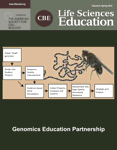Abstract
Introductory biology courses are frequently offered separately to biology majors and nonbiology majors, with the assumption that the two groups of students are different enough to merit different courses. To assess the evidence behind this assumption, we compared students in two different genetics classes at the University of Colorado–Boulder, one class for nonscience majors (nonmajors) and the other class for biology majors and students planning a biology-related career (majors), to see whether these two groups of students were fundamentally different in performance and attitudes. To measure content knowledge, we administered identical assessments to both groups of students during the semester: a validated pre- and postcontent assessment (Genetics Concept Assessment), ungraded quizzes after problem-solving sessions, and questions on each exam. We measured attitudes, study time, and study techniques through online surveys. Majors outperformed nonmajors on content assessments, finishing with significantly higher learning gains. Nonmajors and majors also differed in their motivation, interest, study time, and expert-level of beliefs. We suggest that focusing on the process of science and its connection to students' lives will better engage and motivate nonmajors while still helping them learn the fundamental concepts of genetics.



